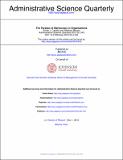| dc.contributor.author | Castilla, Emilio J. | |
| dc.contributor.author | Benard, Stephen | |
| dc.date.accessioned | 2011-09-19T13:48:06Z | |
| dc.date.available | 2011-09-19T13:48:06Z | |
| dc.date.issued | 2010-12 | |
| dc.identifier.issn | 1930-3815 | |
| dc.identifier.issn | 0001-8392 | |
| dc.identifier.uri | http://hdl.handle.net/1721.1/65884 | |
| dc.description.abstract | In this article, we develop and empirically test the theoretical argument that when an organizational culture promotes meritocracy (compared with when it does not), managers in that organization may ironically show greater bias in favor of men over equally performing women in translating employee performance evaluations into rewards and other key career outcomes; we call this the “paradox of meritocracy.” To assess this effect, we conducted three experiments with a total of 445 participants with managerial experience who were asked to make bonus, promotion, and termination recommendations for several employee profiles. We manipulated both the gender of the employees being evaluated and whether the company's core values emphasized meritocracy in evaluations and compensation. The main finding is consistent across the three studies: when an organization is explicitly presented as meritocratic, individuals in managerial positions favor a male employee over an equally qualified female employee by awarding him a larger monetary reward. This finding demonstrates that the pursuit of meritocracy at the workplace may be more difficult than it first appears and that there may be unrecognized risks behind certain organizational efforts used to reward merit. We discuss possible underlying mechanisms leading to the paradox of meritocracy effect as well as the scope conditions under which we expect the effect to occur. | en_US |
| dc.description.sponsorship | Sloan School of Management | en_US |
| dc.description.sponsorship | Wharton School | en_US |
| dc.language.iso | en_US | |
| dc.publisher | Samuel Curtis Johnson Graduate School of Management, Cornell University | en_US |
| dc.relation.isversionof | http://dx.doi.org/doi:10.2189/asqu.2010.55.4.543 | en_US |
| dc.rights | Article is made available in accordance with the publisher's policy and may be subject to US copyright law. Please refer to the publisher's site for terms of use. | en_US |
| dc.source | SFN | en_US |
| dc.title | The Paradox of Meritocracy in Organizations | en_US |
| dc.type | Article | en_US |
| dc.identifier.citation | Castilla, Emilio J., and Stephen Benard. “The Paradox of Meritocracy in Organizations.” Administrative Science Quarterly 55 (2010): 543-576. © 2010 by Johnson Graduate School, Cornell University. | en_US |
| dc.contributor.department | Sloan School of Management | en_US |
| dc.contributor.approver | Castilla, Emilio J. | |
| dc.contributor.mitauthor | Castilla, Emilio J. | |
| dc.relation.journal | Administrative Science Quarterly | en_US |
| dc.eprint.version | Final published version | en_US |
| dc.type.uri | http://purl.org/eprint/type/JournalArticle | en_US |
| eprint.status | http://purl.org/eprint/status/PeerReviewed | en_US |
| dspace.orderedauthors | Castilla, Emilio J.; Benard, Stephen | en |
| dc.identifier.orcid | https://orcid.org/0000-0001-8724-7054 | |
| mit.license | PUBLISHER_POLICY | en_US |
| mit.metadata.status | Complete | |
